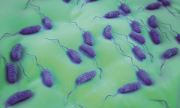Pathogen and transmission
Cholera is a diarrhoeal disease that is caused by the Vibrio cholerae bacterium. This forms a toxin (cholera toxin) in the intestine, which causes diarrhea and can lead to severe fluid loss. The bacteria is generally transmitted through drinking water that is contaminated with faeces or vomit from an already infected person, or through the consumption of contaminated food. Travellers are especially prone to cholera infection in countries with hotter climates and low hygiene standards.
Pathology
Due to the short incubation period of only one to three days, travelers in affected areas can sometimes be surprised by the disease. Most (about 85%) cholera infections cause only mild symptoms, and many cause none at all. But in severe cases, sufferers can develop watery diarrhoea and lose substantial volumes of their body fluids, sometimes accompanied by vomiting. If left untreated, the loss of body fluids and salts can within hours cause circulatory collapse, muscle cramps and – in severe cases – shock and even death. The chance of death occurring can be reduced to under 1%, however, by immediately administering oral rehydration solution. Such swift action is especially vital with infants and older persons.
Distribution and frequency of occurrence
According to estimates by the World Health Organization (WHO), there are three to five million cases of cholera every year, around 100,000 to 120,000 of which are fatal. In the industrialised countries, only isolated imported cases of cholera are seen. This includes Switzerland, where, generally speaking, the Federal Office of Public Health is only rarely informed of cases of travellers abroad who have contracted the disease.
Prevention
Cholera can be prevented fairly easily by following the well-established rule for travellers to risk regions of “Boil it, cook it, peel it or forget it”. This means, in regions in which cholera is widespread, travellers should use only boiled or chemically purified water (even just to clean the teeth), eat only well-cooked food, only eat fruit they have peeled themselves, do without ice cubes in their drinks and wash their hands regularly. Unfortunately, the cholera vaccination offers only limited protection. It is advisable for travelers to bring rehydration salts (available from pharmacies) which can be taken orally.
For further information on the global distribution of cholera and ways and means to avoid cholera infection, consult your GP or a doctor specialising in travel medicine.


